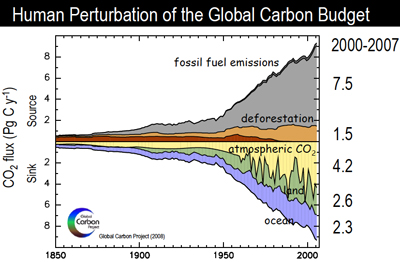CO2 emissions accelerate 400% as world turns to dirtier fuels
CO2 emissions accelerate 400% as world turns to dirtier fuels
mongabay.com
September 26, 2008
With emissions growth accelerating 400 percent this decade, atmospheric carbon dioxide levels rose at a record clip in 2007, reports the Global Carbon Project's annual overview of the greenhouse gas.
Atmospheric carbon dioxide concentrations climbed 2.2 parts-per-million (ppm) in 2007 to 383 ppm. Since 2000 CO2 levels have risen 2 ppm annually, compared with 1.5 ppm during the 1990s, 1.6 ppm in the 1980s, and 1.3 ppm in the 1970s. Rising CO2 levels are the direct result of human activities, including fossil fuel combustion, cement production, and deforestation. The Global Carbon Project's (GCP) report shows that emissions from fossil fuels and cement have increased 3.5 percent per year since 2000, after increasing at a rate of 0.9 percent during the 1990s. The rate of emissions growth exceeds the highest estimates put forth by the Intergovernmental Panel on Climate Change (IPCC). China is the largest industrial emitter of carbon dioxide (i.e. excluding emissions from deforestation), followed by the United States, E.U. countries, Russia, and India.
|
|
When deforestation — a source of nearly 20 percent of emissions — is included, the top-5 list changes: China, the U.S., Indonesia, Brazil, and E.U. nations. Overall the annual loss of around 13 million hectares of tropical forest and degradation of millions more generates around 1.5 billion tons of carbon per year. Emissions from fossil fuels and cement were 8.5 billion tons in 2007.
Sinks for emitted carbon dioxide include the atmosphere, which sequestered 46 percent of emissions from 2000-2007; land, 29 percent; and oceans, 26 percent. Natural CO2 sinks absorb 55 percent of all anthropogenic carbon emissions, significantly slowing climate change. GCP estimates the value of natural mitigation is worth half a trillion dollars per year (based on the current cost of carbon in the European carbon market), but notes that the efficiency of natural sinks has decreased by 5 percent since 1950, "implying that the longer it takes to begin reducing emissions significantly, the larger the cuts needed to stabilize atmospheric CO2".
The report notes that gains in carbon intensity — the amount of carbon used to produce one unit of economic output — are slowing as the world turns to "dirtier" fuel sources like coal.
Carbon Budget 2007 [PDF]
GCP-Global Carbon Budget team: Pep Canadell, Philippe Ciais, Thomas Conway, Christopher B. Field, Corinne Le Quéré, Richard A. Houghton, Gregg Marland, Michael R. Raupach















